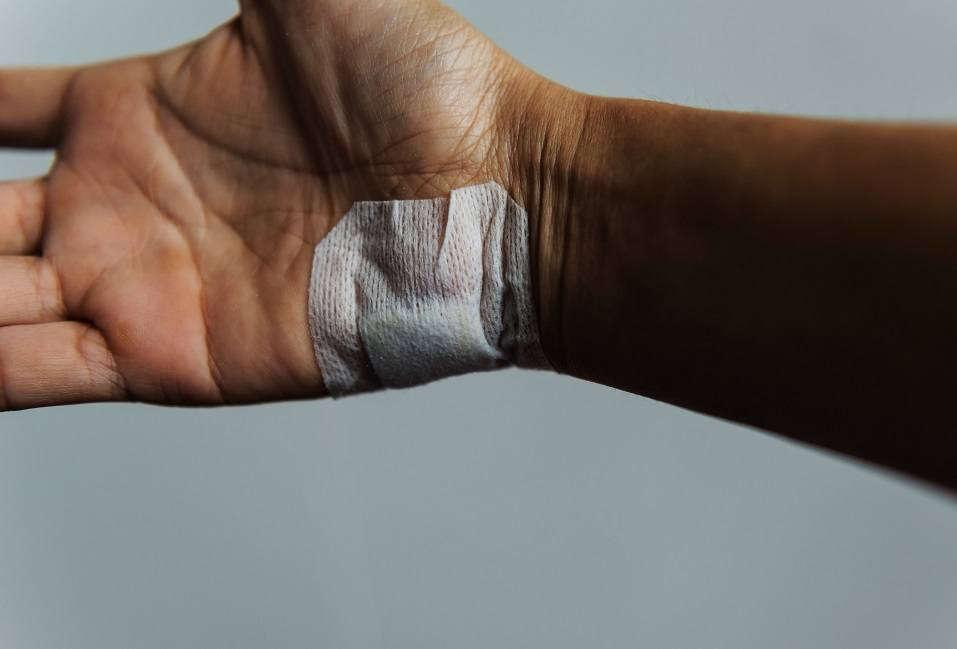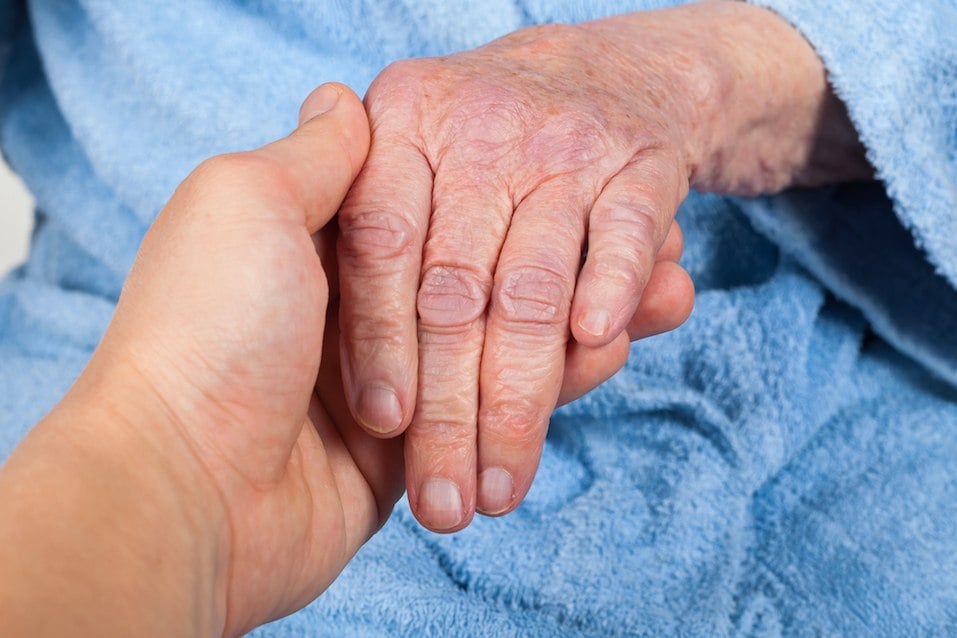These Common Symptoms Are Actually a Sign of Serious Illness
When it comes to your body, it’s easy to ignore any minor aches and pains. We’ve all had a twinge of back pain we’ve managed to get over without medical intervention, and whenever we experience a cough or cold, it usually doesn’t warrant a doctor’s visit. That doesn’t mean you should let every symptom of illness sit on the back burner, however. There are plenty of minor signs that could actually signal you’re experiencing a serious health issue that needs to be addressed.
Here are the signs you should never ignore, including one that could indicate serious thyroid problems (No. 9).
1. Changes in your bathroom habits

Man holding toilet paper | BrianAJackson/Getty Images
Sign of: Prostate, bladder, or colon cancer
It could be your food or drinking habits that are influencing how often you head to the bathroom — but it could also be a sneaky disease that comes with few other symptoms. The American Cancer Society explains bladder cancer can cause changes in how often you urinate, and prostate cancer can cause a slower-than-usual urine stream.
And if you haven’t been checked for colon cancer and you’re over the age of 50, you should be getting screened. This common cancer is also incredibly preventable. A change in bowel habits can also indicate you may have developed it.
2. Snoring

Senior couple sleeping | Wavebreakmedia/iStock/Getty Images
Sign of: Sleep apnea, cardiovascular problems
If you’re just snoring occasionally (or while you have a cold), that’s totally normal. But more consistent, frequent bouts of snoring may be a sign of issues to come. WebMD explains this nighttime habit can lead to obstructive sleep apnea that can cause you to stop breathing repeatedly while you’re sleeping. This can lead to a lack of oxygen to the brain over time, putting major strain on your heart that can lead to high blood pressure and disease.
3. Sore or bleeding gums

Dentist checking the mouth of a girl | iStock.com/LuckyBusiness
Sign of: Heart problems
Reader’s Digest explains there’s a bigger link between your mouth and your heart than you think. A study from the University of Florida found the bacteria that can cause your gums to become swollen and inflamed can also negatively affect your heart. And even more research suggests that having high levels of certain types of bacteria in the mouth could also be linked to having thicker carotid arteries.
You should pay your dentist a visit every six months. Both your teeth and your heart will thank you.
4. Numbness in the limbs

A senior woman getting rehabilitation for her arm. | KatarzynaBialasiewicz/iStock/Getty Images
Sign of: Stroke
You may know a drooping face or having trouble understanding others are common signs of stroke. But if you’re experiencing numbness in your limbs, this is also something that should never be ignored. WebMD says a stroke can occur gradually, and before one strikes, you may find your arms and legs are weak, especially on just one side of your body. Try this test: Raise both of your arms and see if one drops down automatically. This is a sign something worse is to come.
5. Worsening vision

Woman straining to see her smartphone | Tomwang112/iStock/Getty Images
Sign of: Diabetes
Diabetes affects millions, and you can develop it any age. While there aren’t too many obvious symptoms of the disease, one you should pay attention to is if your vision start to blur out of nowhere. Healthline explains blurry vision is one of the first symptoms of hyperglycemia, a sign of diabetes that occurs when sugar builds up in the blood.
If your blurry vision is left untreated, it can turn much worse. Visit a doctor at the first sign of eye problems.
6. Unexplained weight loss

A woman getting her measurements done at the doctor’s office | belchonock/iStock/Getty Images
Sign of: Various cancers
You may be one of the millions attempting to lose some body fat, but if you’ve suddenly lost weight without any idea how or why, this is cause for concern. Cancer.Net explains those who have cancer of any kind often experience weight loss as their first symptom. The publication notes 40% of those diagnosed with cancer said they experienced unexplained weight loss, and for those with advanced cancer, up to 80% reported they experienced this symptom, too.
In addition to weight loss, you may also have fatigue, weakness, or a lack of energy when you develop cancer.
7. Excessive sleepiness

Woman tiredly looking at her computer | AntonioGuillem/iStock.com/Getty Images
Sign of: Kidney disease
It may seem like you’d know for sure if something was wrong with your kidneys, but like so many other diseases, it’s not always so obvious. The National Kidney Foundation notes it’s very common to experience extreme tiredness when your kidneys aren’t functioning optimally. This is due to toxins building in the blood or anemia, which can also cause bodily weakness. As for other symptoms to watch out for, having dry skin, seeing blood in your urine, and swelling around the ankles or feet are all common.
8. Persistent cough

Woman with a cough | Highwaystarz-Photography/Getty Images
Sign of: Chronic obstructive pulmonary disorder
It may start as just a tickle in the back of your throat, but if you find that your cough just isn’t going away, it could be a sign of something worse. Chronic obstructive pulmonary disorder, or COPD, describes all progressive lung diseases that can turn deadly. Whether you have the beginning stages of emphysema, non-reversible asthma, or chronic bronchitis, these all fall under the COPD umbrella term.
While smoking is a major risk factor, it’s not the only way you can develop this disease. Be wary of a phlegmy or dry cough with breathlessness or wheezing.
9. Dry, cracked skin

Dermatologist inspecting middle aged patient’s skin in office | iStock.com/Michael Jung
Sign of: Hypothyroidism
If you’re using up bottles of lotion faster than you can buy them, yet your skin can’t seem to retain moisture, this might be more than just general dryness from the weather. Your thyroid actually controls a lot of bodily processes, including skin health. Rough, dry skin could mean your thyroid is sluggish, explains Dermato-Endocrinology.
Hypothyroidism is when your thyroid doesn’t produce enough necessary hormones. While there are many symptoms you may know of, such as weight gain, watch out for dry skin, too.
10. Difficulty recalling information

A man comforting his father who has dementia | MonkeyBusinessImages/Getty Images
Sign of: Alzheimer’s
If Alzheimer’s runs in your family, you’ll want to stay extra vigilant in knowing the symptoms of the disease. The Alzheimer’s Association explains this disease causes a decline in memory, thinking, and reasoning — and the early signs aren’t always very noticeable. If you do find you can’t recall words, phrases, or peoples’ names that you should know, this could be an early indicator that something’s off. Additionally, take notice if you’re having problems completing everyday home tasks or if you’re misplacing things.
11. Constantly feeling cold

Woman wearing many layers to keep warm | Antonio Guillem/iStock/Getty Images
Sign of: Anemia
You may think you just run colder than the rest of your family, but in truth, feeling chilled constantly could be an indicator of anemia. WebMD explains this condition occurs when you don’t have enough red blood cells to bring your body necessary oxygen. This can then cause you to feel tired, weak, or extra cold.
If you think you may have anemia, a simple blood test can determine this. And dietary changes or adding supplements in can make a huge difference.
12. Having a sore that won’t heal

Hand wound caused by an accident | iStock.com/wissanu01
Sign of: Skin cancer
Even if you’re a stickler for sunscreen, you should be aware of other skin cancer signs. WebMD explains skin cancer often just starts with a change in your skin’s texture, so you may not notice it at first. Additionally, if you have a sore that won’t heal, this can also indicate you have a cancerous growth that needs removal.
Skin cancer is often treatable when found early, so don’t delay. If you notice any abnormal changes in your skin, contact your doctor.
13. Chest pain

Man experiencing chest pain | TeoLazarev/iStock/Getty Images
Sign of: Lung cancer
The American Lung Association notes there aren’t many symptoms of lung cancer until it’s reached its late stages — and that’s one of the reasons it’s incredibly deadly. If you’re a smoker or cancer runs in your family, you should be extra vigilant in keeping track of any possibly signs. If you have chest pain that seemingly never goes away, this is a sign things are amiss. Additionally, pay attention to a constant cough, hoarseness, or frequent lung infections that compromise your ability to breathe.
14. Hand tremors

A senior woman’s hand | Ocskaymark/Getty Images
Sign of: Parkinson’s disease
Parkinson’s disease affects your central nervous system and causes tremors in up to 80% of patients, the American Parkinson Disease Association notes. Not all bodily shakes are associated with Parkinson’s, of course. But if you notice that you’re experiencing hand tremors when you’re at rest more often than when you’re actually moving, then this is a sign you should take note of. In the case of this disease, the tremor is typically just on one side, too.
15. Stiff joints in the morning

Senior man in pain with arthritis | KatarzynaBialasiewicz/iStock/Getty Images
Sign of: Rheumatoid arthritis
Feeling stiff in the morning could just be a sign you’re getting older. But in the beginning stages of rheumatoid arthritis, it’s common to experience this symptom, WebMD notes.
When joint pain first starts, it’ll often feel most noticeable in the morning hours — and by the afternoon, you may not notice it at all. Just because you’re not in pain all day long doesn’t mean you should ignore it, however. If it’s arthritis, the pain will worsen over time when left untreated.
Christine Skopec also contributed to this article.
Meg Dowell also contributed to this article.
Check out The Cheat Sheet on Facebook!
Source: Read Full Article
